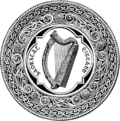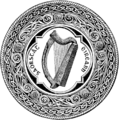Vice-President of the Executive Council of the Irish Free State facts for kids
Quick facts for kids Vice-President of the Executive Council of the Irish Free State |
|
|---|---|

Great Seal of the Irish Free State
|
|
| Residence | No official residence |
| Appointer | Governor-General, upon the nomination of President |
| Formation | 6 December 1922 |
| First holder | Kevin O'Higgins |
| Final holder | Seán T. O'Kelly |
| Abolished | 29 December 1937 |
| Succession | Tánaiste |
The Vice-President of the Executive Council was like a deputy prime minister for the Irish Free State. This country existed from 1922 to 1937. The Vice-President was the second most important person in the Executive Council. The Executive Council was the main group of ministers, also known as the cabinet.
The Governor-General officially appointed the Vice-President. However, this appointment happened only after the President chose someone. The Governor-General always had to agree with the President's choice.
Contents
What the Vice-President Did
The job of Vice-President of the Executive Council started when the Irish Free State was formed in 1922. The Free State constitution said what the Vice-President's main role was. They had to "act for all purposes in the place of the President." This meant they took over if the President was away or couldn't do their job.
For example, if the President died, resigned, or was too sick, the Vice-President would step in. They would act as President until a new one was chosen. If the President was just temporarily absent, the Vice-President would fill in until they returned.
More Than Just a Stand-in
Even though their main role was to cover for the President, the Vice-President also had another important job. They usually held a second ministerial position. This meant they were in charge of a specific government department. They would do these duties when they weren't acting as head of government.
The President could not simply fire the Vice-President. To remove the Vice-President, the entire Executive Council had to be dismissed. Then, a new council, including a new Vice-President, would be formed.
How the Role Changed
Before the Irish Free State, there was a group called the Ministry of Dáil Éireann. It didn't have a deputy leader at first. But in 1919, when President of Dáil Éireann Éamon de Valera went to the United States, he asked for Arthur Griffith to be named Deputy President.
The role of Vice-President of the Executive Council ended in 1937. A new constitution for Ireland came into effect. This new constitution replaced the Vice-President's job with a new one called the Tánaiste. The Tánaiste is still the deputy leader of the government in Ireland today.
Who Held the Office
Here is a list of the people who served as Vice-President of the Executive Council. They also held other important jobs in the government at the same time.
| Name | Picture | Term of office | Party | Other ministerial offices held whilst in post | |||
|---|---|---|---|---|---|---|---|
| Kevin O'Higgins |  |
6 December 1922 | 10 July 1927 | Cumann na nGaedheal | Minister for Justice (1922–1927) | ||
| Ernest Blythe |  |
14 July 1927 | 9 March 1932 | Cumann na nGaedheal | Minister for Posts and Telegraphs (1927–1932) | ||
| Seán T. O'Kelly |  |
9 March 1932 | 29 December 1937 | Fianna Fáil | Minister for Local Government and Public Health (1932–1937) | ||
| This position was replaced by the Tánaiste of Ireland in December 1937. | |||||||
Images for kids
See also
 | Laphonza Butler |
 | Daisy Bates |
 | Elizabeth Piper Ensley |


